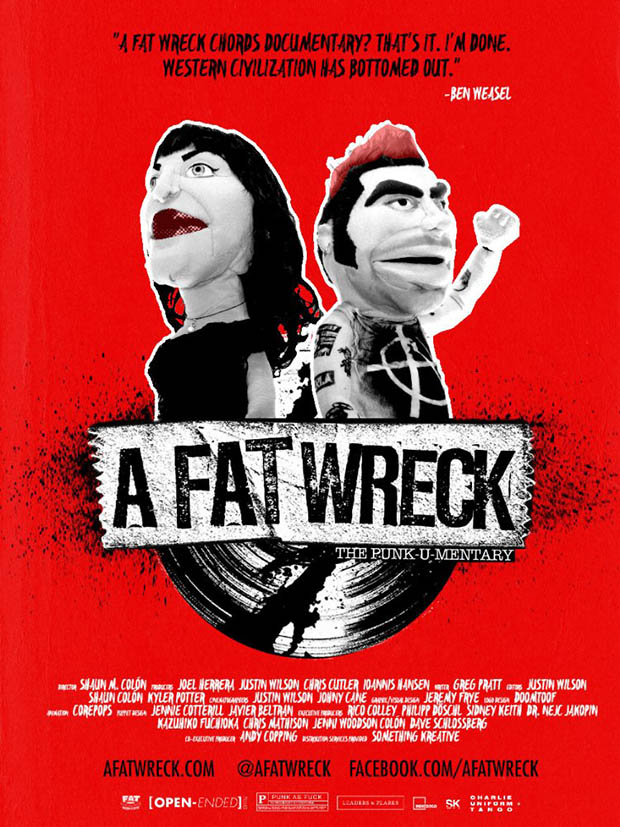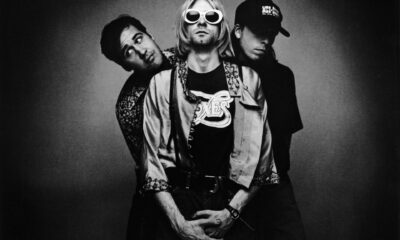Film Review
Shaun Colon – “A Fat Wreck: The Punk-U-Mentary” [Film Review]
The film divides the Fat Wreck Chords’ history into four generations of bands: 1990-1999, 2000-2009, 2006-2011, and 2012-2015. When it’s over, the film feels like a series of missed opportunities shrouded in self-congratulatory anecdotes.

To put it mildly, A Fat Wreck: The Punk-U-Mentary celebrates the history of Fat Wreck Chords, the independent record label founded by NOFX front man “Fat Mike” Burkett. Existing within a vacuum that lacks peripheral vision and objectivity, the film is simply a 90 minute advertisement for the label and its bands. There’s no story. There’s no struggle. There’s no fight against hardships. In fact, there’s almost zero conflict at all.
What’s more, there’s no story that links the concept of an “independent punk label” to anything you probably already know about independent punk labels, like hard work, playing countless low-paying gigs, touring in rundown vans, or living on a steady diet of ramen noodles to finance the recording of your next album. Nope, the film is simply a medium for the bands and their label president to heap praise on one another. All that said, it is a well-made film and is in no-way amateurish or hard to watch. The film’s subjects are likeable and entertaining and if you are a dyed-in-the-wool Fat Wreck Chords fan, you will most likely love this film as it confirms your fandom at each turn.
However, if you know little about the label and its artists it comes across as an insider’s film. Nothing in the film distinguishes Fat Wreck Chords from any other independent label of the era or those persisting today. There’s no attempt to provide insight into how the label operates or how it navigated the ebbs and flows in both punk and popular music or the economy. Yes, Fat Mike admits they didn’t make as much money in the early 2000s as they did in the 1990s, but it’s never revealed how the label adapted to this change. Certainly, the rise of digital music played a role. But, if the label did anything in response in an effort to keep producing albums and support its roster of bands it isn’t discussed in this film. There’s no story about Fat Mike turning down a band or cutting a band from the Fat Wreck roster. Indeed, this kind of transparency would have given the viewer something to sympathize with. But, Fat Mike just shrugs it off, “We were able to pay our salaries.”
The film divides the Fat Wreck Chords history into four generations of bands: 1990-1999, 2000-2009, 2006-2011, and 2012-2015. However, the first generation takes up three-quarters of the film and the rest of the history is given scant attention. After introducing Fat Mike, NOFX, and the start of the label, the film features five-to-seven minute segments on Lagwagon, No Use For A Name, Propagandhi, Good Riddance, and Strung Out. Producer and engineer Ryan Greene (who recorded the majority of the label’s releases and helped define the label’s sound) is also given a few minutes to discuss the general process of how some records were made. The last quarter of the film covers Fat Mike’s Punk Voter movement, a semi-spotlight on some of the current staff at Fat Wreck Chords, and some exposure is given to Erin Kelly Burkett who runs the business side of the label. When it’s over, the film feels like a series of missed opportunities shrouded in self-congratulatory anecdotes.
The documentary glosses over historical details to such a degree it makes you suspect it ignores some facts to support its main goal at presenting Fat Mike as the coolest dude ever. For example, the film says that Fat Mike worked at legendary punk label Epitaph for two weeks and then started Fat Wreck Chords. The only individual associated with Epitaph to appear in the film is former Bad Religion bassist Jay Bentley, who – in about 15 seconds of film time – reveals that Burkett also had the advantage of learning from Epitaphs mistakes. What the film doesn’t reveal is that from 1989 to 2000, Epitaph Records released seven NOFX albums. It’s certainly more plausible that this decade plus relationship is where Fat Mike really learned how to run an independent record label. But, then perhaps the filmmakers would have to own the fact that the label didn’t do anything revolutionary itself, but rather copied the template of Epitaph. There’s zero shame in that fact which makes its absence puzzling.
The film would have also benefited greatly from appearances from individuals outside of the Fat Wreck family. This would have provided the film and its subject context and credibility. Again, other than Jay Bentley, there’s no other single individual in the film that isn’t directly associated with Fat Wreck Chords. By including “outsiders,” the film could have better solidified the concept that the label and its artists were significant outside their own clique. Without, it’s just one big circle jerk. And that is why the film is irrelevant to anyone outside the fan base.
Fat Mike is so delectably tone-deaf that unintentional humor is frequent. For example, when he declares naming the label after himself as “ingenious,” or his final line in the film where out of nowhere he declares punk rock as all about doing drugs and partying. It’s the kind of insight only a teenager could provide. Or a 49-year-old man with a Mohawk. A Fat Wreck won’t change your life and there’s no reason to seek it out. If you’re already a fan of the films subject, you’ll probably enjoy the self-flagellation as much as they do.
Run Time: 88 minutes
Release Date: December 13, 2016
Check out the A Fat Wreck official festival trailer
-

 Hardcore/Punk6 days ago
Hardcore/Punk6 days agoHastings Beat Punks Kid Kapichi Vent Their Frustrations at Leeds Beckett University [Photos]
-

 Culture6 days ago
Culture6 days agoCirque Du Soleil OVO Takes Leeds Fans on a Unique, Unforgettable Journey [Photos]
-

 Alternative/Rock5 days ago
Alternative/Rock5 days agoA Rejuvenated Dream State are ‘Still Dreaming’ as They Bounce Into Manchester YES [Photos]
-

 Indie7 days ago
Indie7 days agoMichele Ducci Premieres Bouncy New Single “You Lay the Path by Walking on it”
-

 Culture15 hours ago
Culture15 hours agoDan Carter & George Miller Chat Foodinati Live, Heavy Metal Charities and Pre-Gig Meals
-

 Alternative/Rock1 week ago
Alternative/Rock1 week agoWilliam Edward Thompson Premieres His Stripped-Down “Sleep Test” Music Video
-

 Country1 week ago
Country1 week agoJayce Turley Reflects on “Misery” with the Premiere of His New Single
-

 Hardcore/Punk7 days ago
Hardcore/Punk7 days agoSpiders from Uranus Premieres Their Debut Album ‘Blow It Out!’













